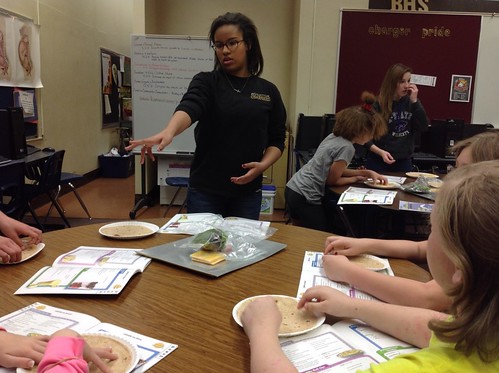
The following guest blog highlights the creative and successful Team Nutrition curriculum in Kansas. Thanks to a Team Nutrition training grant, the state has been able to implement the curriculum in many of their school districts. Kansas students are now receiving the nutrition education they need to thrive in school and empower their classmates.
By Jill Ladd and Emily Brinkman, Kansas State Department of Education
After receiving a Team Nutrition (TN) training grant in 2013, we (the Kansas State Department of Education) implemented our Power Panther Pals (Pals) nutrition education curriculum in 110 schools across the state. Through this effort, which took place during school year (SY) 2014-2015, we reached more than 13,000 students and garnered important feedback from teachers, students, and other stakeholders.
Pals is a Kansas Team Nutrition education and physical activity curriculum. Since its inception in 2003, Pals has been regularly updated and expanded to target additional grade levels, including Pals Primary from kindergartner to second grade and Pals Intermediate for third grade to fifth grade students.
The program includes eight weeks of lessons and provides between 60 to 90 minutes of nutrition education per week. Pals meets nutrition education requirements for the HealthierUS School Challenge (HUSSC), and helps our schools meet components of the Kansas School Wellness Policy Model Guidelines.
The Eat Smart. Play Hard. message, along with TN’s key messages, is at the core of each Pals programs. Participants use an activity booklet to learn how to prepare and enjoy a variety of healthy snacks including fruits, vegetables, low-fat dairy products, lean protein, and whole grains. Plus, a physical activity component is also included with each lesson. At the end of the eight weeks, activity books are taken home and students are encouraged to share what they have learned with their families.
During SY 2014-2015, a portion of our TN Training Grant was distributed via sub-grants to schools who were implementing Pals. These schools conducted cooking/tasting activities to complement the weekly nutrition education lessons. According to evaluation results, food-based activities were a favorite among participating students, and teachers commented on how effectively these hands-on activities enhanced student learning.
In addition to awarding sub-grants to schools across the state, we also awarded sub-grants to several high school-level family and consumer science classes. These classes applied for the sub-grants because the high school students wanted to teach the Pals curricula to elementary students in their districts.
High school students at Lebo Waverly school visited third and fourth grade classrooms every Friday for eight weeks to teach the nutrition lessons. They assisted the elementary students in preparing nutritious snacks, and they also led the younger students in physical activities. Additionally, each high school student was paired with an elementary student to serve as a healthy role model during the program implementation.
The Foundations for Early Childhood Development class at Burrton School used Pals materials to complete nutrition lessons with the fifth graders in their district. Elementary teachers were impressed with how well the fifth graders listened and responded to the high school students. The partnership was promoted district-wide via the school television channel.
Partnering high school students with elementary school students proved to be successful in delivering nutrition education and building positive relationships. This method ensured that high school students mastered nutrition concepts and developed public speaking and leadership skills. Likewise, the method helped elementary students learn about nutrition while observing positive role models.
To learn more about our work and to access Pals program materials, visit our Kansas Team Nutrition website.
